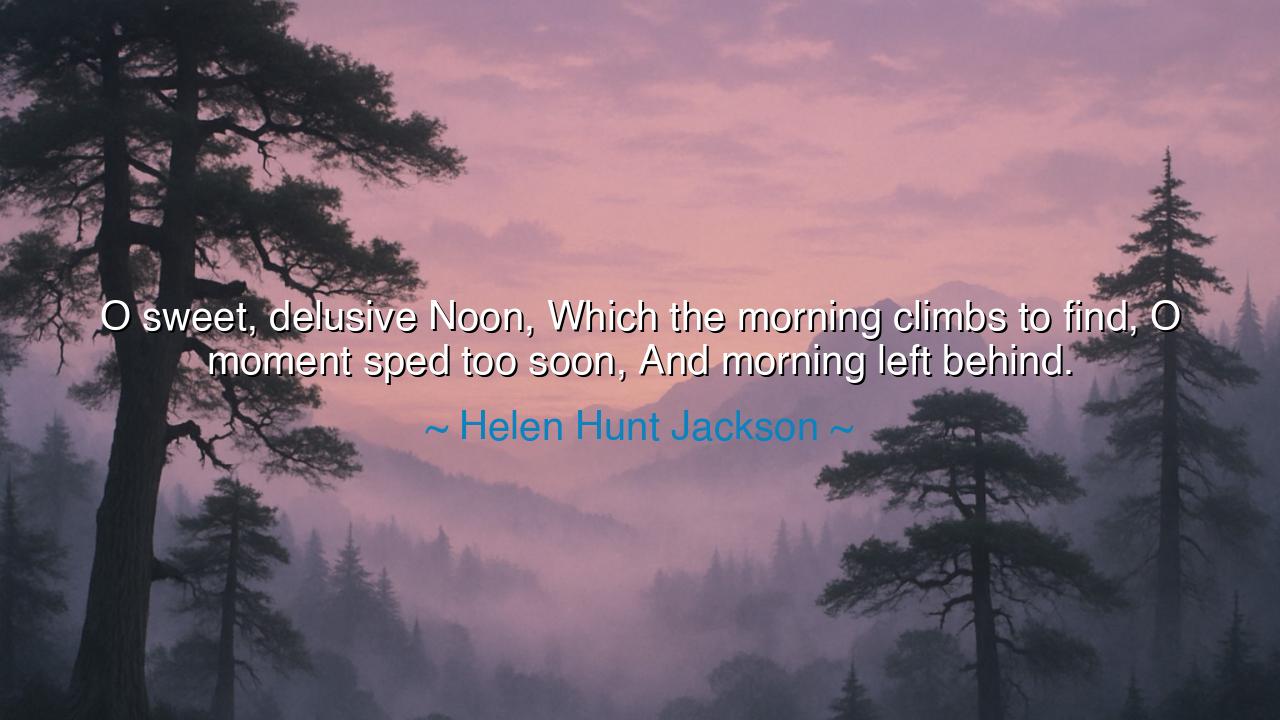
O sweet, delusive Noon, Which the morning climbs to find, O
O sweet, delusive Noon, Which the morning climbs to find, O moment sped too soon, And morning left behind.






“O sweet, delusive Noon, which the morning climbs to find, O moment sped too soon, and morning left behind.” In these words of Helen Hunt Jackson, there resounds both the music of nature and the lament of the human soul. She speaks not merely of the sun at its highest, but of the deceptive promise of life’s peak—the fleeting instant when the climb seems fulfilled, yet the descent has already begun. Noon, so radiant, so full, is but a fragile pause in the eternal rhythm of time.
The morning is the symbol of hope, the rising of youth, the striving of ambition. All the hours of dawn point toward the fullness of noon, just as all youthful endeavors point toward strength, mastery, and glory. Yet when Noon arrives, it is never as eternal as the heart desires. Its sweetness is real, but its permanence is an illusion. Like sand through the fingers, the moment of perfect balance slips away, leaving the seeker with memory rather than possession.
History itself shows us this truth. Think of Alexander the Great, who at a young age conquered the known world. His life was a rising morning toward glory, and when he stood at the summit, master of empires, that very Noon was also the beginning of his decline. He died at thirty-two, the sweet moment sped too soon. His conquests, though vast, could not stop the tide of time, and his empire fractured like a clay vessel. Thus does Noon reveal its delusion: it promises permanence, but it carries within it the seed of passing.
Yet this fleeting nature of Noon is not a curse, but a gift. The ancients taught that if life were endless in its highest joys, the soul would grow numb to their sweetness. It is because Noon fades that it becomes precious. The brevity of the moment awakens gratitude, teaching the heart to cherish what is present rather than to chase the mirage of permanence. Like the blossoms of spring, whose beauty lies in their fragility, so too the zenith of life becomes sacred through its passing.
One may see this truth in the lives of poets themselves. Helen Hunt Jackson, who wrote these lines, knew of loss, grief, and the swift passing of joy. She poured into her verse both the longing for eternal moments and the acceptance that they must slip away. Her words echo like ancient wisdom: do not curse the shortness of Noon, for its very brevity is the mirror in which we see the wonder of the morning that led us there.
The lesson is clear: live each Noon not as though it were a possession, but as though it were a vision—brilliant, brief, and meant to guide rather than to stay. Do not cling, for clinging turns sweetness to bitterness. Instead, embrace the passing, and carry its light into the afternoon of your days. Let each triumph, each joy, each sacred pause be enough in itself, without demand that it endure.
Therefore, children of the sun, let the rhythm of dawn, noon, and dusk teach you. Rise each morning with hope, labor toward Noon with vigor, and when you arrive at that sweet, delusive hour, rejoice with all your soul, knowing it will not last. For the soul is not meant to linger at a single point, but to move onward, gathering wisdom from each stage. The true strength is not in freezing time, but in walking with it, unafraid of its passing.
So remember: when your Noon comes—be it in love, in success, in health, or in youth—lift your face to the light. Do not despair when the moment fades, for it was never meant to be your possession. It was meant to be your teacher. And in learning this, you rise above the delusion, carrying with you not the shadow of what is gone, but the eternal flame of what was truly lived.






AAdministratorAdministrator
Welcome, honored guests. Please leave a comment, we will respond soon